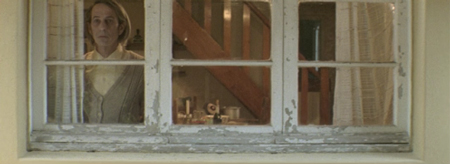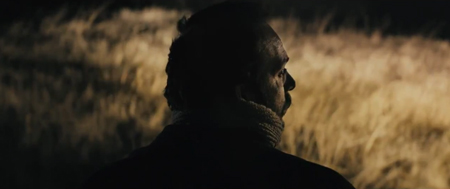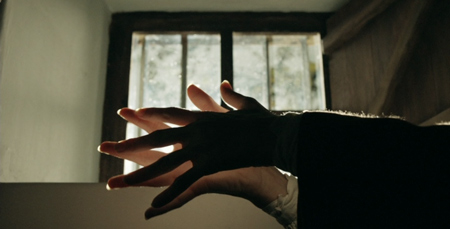
If I had followers I would apologise for my lengthy absence, but instead I’ll just call attention to it for no reason, to no one in particular. Hey. I attended my city’s film festival (that’s Melbourne for those nonfollowers not playing at home) again, its 60th anniversary, and saw more films than last year: A round 20 in cinemas, a further five features via MUBI for free (please retain this gift every year, MIFF). Since I attended the ridiculously faulty projection of The Turin Horse (in which one reel was half out of frame and the last 30 or so minutes were accompanied by a house lights spectacular ruining the film), I was given a free pass, which I spent on a Surprise Screening prior to their titles being announced -ultimately giving me the sole picture of the festival I disliked. Wow, this is riveting shit, right? Anyway, I wrote little bits throughout the festival when I was bothered to, and have collected them here. They are mostly informal, and some are plain crap. But the idea is to provide others a sense of what’s worth making a priority or what to look out for. I will also take the opportunity of having seen some 2010 films to update my list of last year’s best.
In the order I saw and wrote about (most of) the films, my thoughts:

La Havre was gorgeous, so gorgeous. I’m not sure Aki has ever been so concerned with issues of the zeitgeist, and he threads such things together with the beloved proles, rock music, and love stories the have defined him, along with some reflection on aging. Intriguing use of teal in the set design.
Melancholia is good. Lacks the vicious irony of much of his work and struck me as earnest, which was nice. After a stunning slow motion prologue of bombastic strings over effects-laden tableaux that people will call a massive wank, it jumps into his usual handheld Bergman-esque dramas of some depth, with Dunst’s half (the wedding) being less of a (actually not boring) slog than Gainsbourg’s and probably containing Trier’s best comedy work. Gainsbourg herself is featured every bit as much as if not more than Dunst is, surprisingly. There’s a bit more going on under the surface that I’ll have to ponder on. That being said, I can’t imagine wanting to watch it again for some time.
Later: It’s in the same vein [as Antichrist], certainly stylistically, furthering his impeccable Tarkovsky-inspired digital art whilst retaining that less impressive (but perhaps necessary) handheld stuff. The lighting during the wedding half is so gorgeous, it just glows. However, for me the ambivalence of the relationships, that is to say the richer push and pull, the fleeting good moments that at least exist -and the comedy -make this a stronger film than Antichrist which felt like more provocation and was derived from a deeply depressive mind that I could not appreciate. I just wish Gainsbourg’s half wasn’t quite so ordinary. I said I wouldn’t want to watch it again for quite some time, but that’s no longer true -at least not for the tableaux parts with that increeeedible score which I so want to have washed over me again this moment.

Cave of Forgotten Dreams was a fucked up showing: first the sound was garbled, causing people to stomp their feet and boo until it was fixed, which it was, until 2 minutes from the end it shut down and we had to wait 5 minutes and rewatch part of the film just to see the final two minutes, with a minor crash again. Seriously incompetent. The film was actually pretty great, Herzog waxing poetic and observing idiosyncracies like usual. His 3D doesn’t just map the contours of the cave walls/canvasses but also those contours of the explorers’ faces as they observe. Herzog attempts to understand nascent drawing/painting, music, religion, weaponry, and man’s relationship with all the animals either dreamt and rendered or left to die and remain in the cave. Fascinating.
El Velador is that modern kind of documentary with not just no talking heads, but next to no spoken words altogether, just observational bits and pieces surrounding the workers and grievers of a cemetary made up of mini cathedrals/palaces that are actually extravagant (and tacky) mausoleums housing the, uh, victims of this extraordinarily violent region. Bits of news regarding the drug cartels (deaths, politicians asking for US assistance, etc) are infrequently shown via an old television, but the credits lists these as archival, possibly demonstrating a forced hand in this non-narrative portrait; thus it could be in the field of Alamar or Le Quattro Volte -but apparently not enough to label it fiction. There were a few walkouts, as it has no story or narration. The auteur sheds light on those still living in this place of (never-seen) death, going about daily routines and rituals. It’s not a polemic, nor a genre picture glorifying then demolishing members of drug cartels, but a small-scale humanist chronicle that does not fail to ignore the absurdism inherent in what we are witnessing. The final shot is, well, really two-part, and just perfect. I like this film the more I reflect on it. Not always engrossing, but judicious.

Finisterrae was cute and I admire its absurdism and images and sounds, but I’m not that taken by it. When he views some 80s video art through a hole in a tree that whistled to get his attention… “it’s very funny”. The ghosts are adorably deadpan. I reckon this would become more and more delightful with rewatches.
Martha Marcy May Marlene was alright. It’s very careful in terms of the depiction of both this anti-establishment makeshift cult and Martha’s bourgeois remaining family; at times the cult seems more pleasant and warm while the sister and her husband are a trifle detatched and operate quite rigidly via social norms, their way of living Martha seems to find futile and unfulfilling whereas there was a time she was nurtured (or made to think she was) at the farm. Of course, the cult perform rituals and crimes with delusional or irrational motives, the likes of which we’ve heard about in the news, that ultimately appear to eat at Martha until she flees. The visual MO here is not easy to pin down, it is shot in assured static long takes where subjects move slightly in or out of frame, and along with a lack of score the approach is somewhat objective, but the editing strategy suggests Martha’s uneasy mental state, with flashbacks woven into present experience demonstrating her inability to shake the cult and its effect on her. It’s a far less clumsy execution than that of Blue Valentine. The Olsen girl for me strongly evoked Vera Farmiga, and her curves are given a curious attention, we are supposed to see her as inherently, easily maternal in contrast to her sister. I was worried her experience with a cult was going to be too esoteric and thus I guess lessen the film’s merit, but it finds some universality in the question of nurture and self-worth. But, perhaps, not quite enough. Often on the side of flat rather than unnervingly austere.

Is it too early to say The Innkeepers is one of the best horrors ever made? Oh, right, I have my own canon, so it is. West might be the true heir to Polanski, he certainly displays an assured sense of filmmaking accentuating a foreboding worthy of him. But this film is something no Polanski has been for me: often fucking scary. It’s divided into chapters, and near the beginning of the first the male employee shows the female employee one of those internet videos during which the viewer stares at a static image until a creepy girl bursts into sight, a scream blaring. Anyone who saw The House of the Devil knows this was basically that film’s same scare tactic -anticipation (a commendably long delay nonetheless broken up with sinister happenings outside the titular house) and shock (a bloody ending that fails to satisfy). I once mentioned to a friend that had the film ended with no satanic cult, with the protagonist completing her housesitting duty unharmed, the film as revisionist statement/object would be total. But West is no modernist with an agenda, the stretches proceeding the more familiar final moments impart a withholding that may be slightly revisionist, to reclaim horror as an intelligent craft in a milieu proliferated with so-called torture porn trash, but truly West is applying his own patient sense of tension first and foremost. However, the aforementioned chapters and internet video here act as Brechtian-like devices, the former interrupting dramaturgy and the latter hanging over the suspense sequences a teasing reminder. But simultaneously and far more significantly it is classically dramatic, that is to say West implicates the viewer in the scares along with our protagonists as horrors generally do, with masterful skill. It’s a curious and somehow non-abortive contradiction, but viewers today already view horror films cynically predicting scares. The film has a highly typical ghost story that is never fleshed out because…who fucking gives a shit? Certainly not I, and I was grateful for the lack of melodrama. And finally, West proves that he is also a good writer, the slacker comedy element and general characterisation are built with nuance. I have all the usual nagging thoughts…that this is just a genre piece, albeit a strong example, and won’t hold up next to weightier films, but for now I’m just gonna enjoy it.
An aside here: A second viewing of The House of the Devil revealed dullness and I can no longer say I am a fan, nor am I of West’s previous The Roost or Trigger Man at all, though he is clearly improving over time.

Detroit Wild City is sort of nicely meandering and generally meditative, initially dystopian and architecturally-minded before discovering the seeds of new life and hope in parts of the city and people start to proliferate the images. The talking head subjects occasionally spout something truly thoughtful or poetic. I had no idea Detroit was in such a state, to be honest.
Jess + Moss was a mix-tape of pretty, grainy/noisy images of an idyll lazy summer shared between cousins. It may not have been a summer, maybe they hang out all year. Anyway, it evokes the senses and emotions of such an experience pretty well. I could have done without the parental misery as foregrounded as it was. A bit twee.
Post Mortem is quite flat at first, actually the whole way through, but it becomes intriguing enough and the black humour of his previous film carries on blacker still and less Scorsese-like. Certainly companion to Tony Manero in many ways.
The Dardennes’ The Kid With a Bike is as strong as their best work, lightly riffing on Bicycle Thieves as they did with Mouchette. No easy judgments, moving without prying from you, and seemingly effortlessly crafted.
Good Bye has some of the finest steely grey hues you’ve ever seen. And it’s like Jeanne Dielman in that it exhaustively details her every action, the problem is her every action is typical build-up plotting as she tries to escape the country. It’s quite tedious; certainly a very, very serious affair. Mixed on it.

Once Upon a Time in Anatolia contains a shot early in the film so beautiful tears welled up, then continues to be about as stunningly photographed in all night scenes. A lot of Kiarostamian long shots of cars driving over the hillside with dialogue over the top. The film could be a riff on the glorious opening of Leone’s Once Upon a Time in the West, with the men’s dead-time shown in exhaustive, mesmerising detail. It’s quite like a NW Romanian film, eschewing the classical plot dramatics of a Hollywood or South Korean genre movie (often the camera remains with men waiting as they ponder alone or together while “action” goes on around the corner), but even more so in its black farcical humour derived from incompetence and bureaucracy and charm of character. It is indeed Ceylan’s most comedic film, despite the black absurdity of much of Distant. It’s about men, mainly, and it’s quite rich in that sense. A step up from his last film.
Hors Satan is perhaps Dumont’s most difficult-to-decipher parable, but I’ve hardly reflected on it much as this is a festival I’m attending. Rife with religious symbolism. Anyway, I loved its commanding, assured filmmaking. Ceylan and Dumont discover and photograph faces exquisitely.
The Day He Arrives follows Hahaha as a less formalist but more delightful Hong output. Indeed it is one of his funniest pictures. His trademark twice-told narratives here take shape in repeated lines, scenes and single shots, but there is no structural or temporal shifting (the film is linear), instead they take the form of drunken forgetfulness but ultimately go beyond just that. This protagonist (a director, of course, or at least he was at one time) refuses to attach himself to anything or anyone for very long, so he stagnates. All the repetition, and the conversations throughout, echo this idea. Since I really admired the more narratively audacious Oki’s Movie as well, Hong is on a fucking roll.

Tales of the Night, so delightful. The 3D was designed with far less depth than I was expecting, but it’s elegantly subtle. The parables are traditionally moral and told with a repetition that makes for a wonderfully droll rhythm. It’s very French in that playful modernist way, but the postmodern Ocelot typically jumps around geographically and in time with each story and the result is something vaguely affiliative whilst celebatory of history and culture.
Jeonju Digital Project 2011. I hardly understood Straub’s short as is par for the course. Claire Denis’ is more of a DVD extra that will inevitably appear as just that seeing as it’s in preparation for an upcoming fictional feature based on the people encountered here. Which I am glad about, since this is clearly a sketch of a historically and socially complex milieu. I would have been disappointed had it not been for Jose Luis Guerin’s excellent final segment (Memories of the Morning), in which he portraits his own neighbours in relation to each other but specifically to the suicide of a violinist and its effect on them. It’s basically more of what made Guest great, the real people and the bits of light dashing across the wall and papers blowing in the breeze. He’s lovely.
The Debt. 2010? I’m guessing this was delayed for the awards season. This is pretty standard, impersonal Hollywood exploitation fare. It will be deemed important by idiots. There is one decent suspense set piece, but it is suspenseful more in terms of the situtation than in the filmmaking accentuating that. Jessica Chastain, again? She looks just like Jennifer Garner with this dark hair. Good actress, though.

Ranked MIFF viewings:
- The Turin Horse (Tarr/Hranitzky, Hungary)
- Le Havre (Kaurismäki, Finland)
- Once Upon a Time in Anatolia (Ceylan, Turkey)
- The Day He Arrives (Hong, South Korea)
- Outside Satan (Dumont, France)
- Cave of Forgotten Dreams (Herzog, Germany/France, 3D)
- The Innkeepers (West, USA)
- Memories of a Morning (Guerín, Spain, Jeonju Digital Project 2011)
- Tales of a Night (Ocelot, France, 3D)
- The Kid With a Bike (Dardenne/Dardenne, Belgium)
- Melancholia (Trier, Denmark)
- Terri (Jacobs, USA)
- El Velador (Almada, Mexico)
- A Useful Life (Veiroj, Uruguay, via MUBI)
- Foreign Parts (Paravel/Sniadecki, USA, via MUBI)
- Post Mortem (Larraín, Chile)
- Detroit, Wild City (Tillon, France, via MUBI)
- Green Crayons (Radwanski, Canada, via MUBI)
- Martha Marcy May Marlene (Durkin, USA)
- Good Bye (Rasoulof, Iran)
- Take Shelter (Nichols, USA)
- Beginners (Mills, USA)
- The Accordion (Panahi, Iran, with Good Bye)
- Jess + Moss (Jeter, USA)
- Finisterrae (Caballero, Spain, via MUBI)
- Jean Gentil (Guzmán/Cárdenas, Dominican Republic/Mexico, via MUBI)
- To the Devil (Denis, France, Jeonju Digital Project 2011)
- An Heir (Straub, France, Jeonju Digital Project 2011)
- The Debt (Madden, UK/USA)
Ranked previously-seen titles screened at MIFF 2011:
Mysteries of Lisbon, Happy Together, An Autumn Afternoon, The King of Comedy, Beauty and the Beast, The Third Man, Oki’s Movie, Outer Space, La Dolce Vita, Tuesday, After Christmas, Essential Killing, The Devil’s Playground, Curling, I Wish I Knew, Boxing Gym, Class Relations, Barking Dogs Never Bite, The Big Sleep, Outrage, Submarine, Jane Eyre
Films I most want to see post-MIFF:
Pastourelle, Drive, A Separation, Innocent Saturday, Gummo, The Apple, Littlerock, Beauty, The Mill and the Cross, Play, Principles of Life, Clay, It May Be that Beauty Has Strengthened Our Resolve – Masao Adachi, Face to Face, Tomorrow Will Be Better, Grey Matter, The Woman, RUHR, Project Nim
*

Updated top 20 of 2010:
- Certified Copy (Kiarostami)
- Mysteries of Lisbon (Ruiz)
- Uncle Boonmee Who Can Recall His Past Lives (Weerasethakul)
- Le Quattro Volte (Frammartino)
- Hahaha (Hong)
- The Strange Case of Angelica (Oliveira)
- The Social Network (Fincher)
- Guest (Guerín)
- Another Year (Leigh)
- Leap Year (Rowe)
- Oki’s Movie (Hong)
- Poetry (Lee)
- The Ghost Writer (Polanski)
- Cave of Forgotten Dreams (Herzog)
- Unstoppable (Scott)
- Meek’s Cutoff (Reichardt)
- Aurora (Puiu)
- Tuesday, After Christmas (Muntean)
- Essential Killing (Skolimowski)
- Curling (Côté)
Here I will just add that a) I think 2010 was a phenomenal year for movies,
b) the ranking above was hardly thought through at all and I don’t care, and
c) Godard’s Film Socialisme had such striking images and sounds in its cruise half I feel it needs to be mentioned. I will also mention Detective Dee and the Mystery of the Phantom Flame for its assured sense of action/mystery/sex comedy rhythms, and The Autobiography of Nicolae Ceausescu for sheer audacity in conceit.
